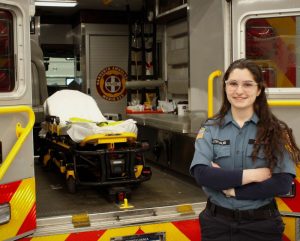
At 21 years old, Devora Weintraub has spent almost a quarter of her life as an emergency medical technician.
The daughter of a physician father and science teacher mother, the Bala Cynwyd native and University of Pennsylvania student was indoctrinated with a love of medicine and learning at a young age. Knowing she wanted to go to medical school early on, Weintraub was not intimidated by the extra schooling that becoming a doctor of medicine would require. Instead, she was eager to get a jump start.
“I didn’t want to have to wait those eight additional years to start practicing medicine, so I realized that becoming an EMT was a shortcut to get started, to get my feet wet,” Weintraub said.
At 16, Weintraub became an EMT at Narberth Ambulance, where she has volunteered for nearly six years, working at least a 12-hour shift per week, balancing a full school course load and involvement at the Orthodox Community of Penn, where she serves as chesed chair. She and her family are members of Young Israel of the Main Line.
Among the 50 other EMTs at Narberth Ambulance, Weintraub is one of the few women and the only Orthodox Jew.
“For a lot of my coworkers, I’m the first Orthodox Jew that they’ve ever met in their life, and some of them, the only one that they know,” Weintraub said.
According to Weintraub, EMT work is a “boys’ club,” and the team took time to adjust to Weintraub’s cultural practices that she maintained as an EMT: not volunteering on Shabbat and wearing long skirts, even during her shifts. Weintraub also keeps shomer negiah, the halachic principle that people of different sexes should not touch each other before marriage.
Under shomer negiah, Weintraub would not be allowed to touch male patients or coworkers, making her job nearly impossible to fulfill at times. To navigate being an Orthodox Jew in an intimate, secular environment, she invokes another halachic principle.
“When I walk into work, everything I do is in the name of pikuach nefesh (saving a life), so really, that overrides everything,” she said.
In the name of saving a life, Weintraub will ignore shomer negiah, even if a patient has a non-life-threatening injury, such as a broken leg.
“It might not be an immediate life threat, but down the line, if I don’t splint it or somebody else doesn’t splint it, it can lead to other issues,” she said.
In other, more serious situations, drawing a line between pikuach nefesh and shomer negiah is trickier. Weintraub uses the example of a male patient having an issue with a catheter. In this instance, she would enlist the help of a male coworker, not just to preserve shomer negiah, but also the dignity of the patient in need.
Weintraub has discussed her religious and personal boundaries with Jewish community leaders and rabbis. At this stage in her life, she decides to shake hands with men in a professional setting or high-five a male coworker after a particularly difficult shift. The work, after all, is emotionally and mentally draining, and something as simple as a high-five can be an important team-building and morale-boosting action. She draws the line at hugging, however, and her coworkers respect her choice.
Working with the same team of EMTs, Weintraub sees the other volunteers as a family of sorts. There’s a lot of good rapport underneath some crude jokes and an abundance of curse words, she said. The team is there to debrief with each other after harrowing 911 calls.
Outside of her Narberth Hospital team, Weintraub processes her work with friends and Jewish community members or tries to compartmentalize her shifts when she’s finished. She’s grateful she got started as an EMT young — when she couldn’t overthink the job or back down.
“It’s scary; it’s a lot of responsibility,” she said. “I think I just sort of jumped in the deep end, and if I hadn’t, I don’t think that I’d be here now.”
But despite the difficulty of the job, Weintraub is committed to continuing.
“I really enjoy the aspect of being invited into people’s hardest days of their life and trying to make it a little bit better for them,” she said. ■






